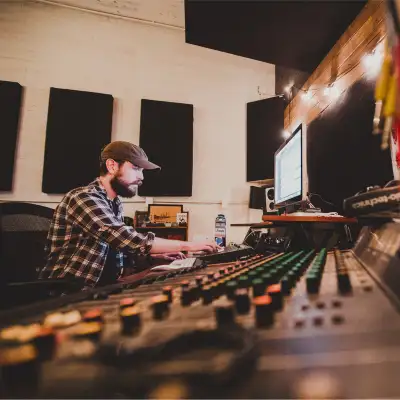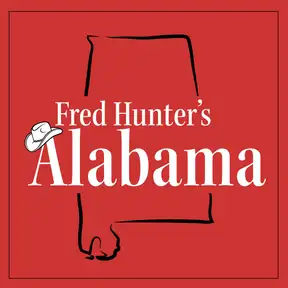Fred Hunter: The Storyteller Becomes the Story
Fred Hunter is a storyteller in the truest Southern tradition — an oral historian who preserves the voices and places of Alabama through lived memory and vivid detail. Recently, we flipped the microphone on Fred and discovered that his own story is as colorful as any he’s told to his audiences.
“I was born here at the old Fort Payne hospital,” Fred says. It’s the same Northeast Alabama town where his parents first met. His father, a Navy veteran who was with the occupation forces that sailed into Tokyo Bay on the USS Yosemite, came into town one day to buy a pair of pants. Having entered the forces at age 16, he’d outgrown his civilian clothes. Inside Pruitt’s Dry Goods, he met the clerk who measured him for his new clothes.
“According to my uncle,” Fred recalls, “he came back out and got in the car and said, ‘I just met the girl I'm going to marry.’”
That sailor was Tyrus Frederick Hunter. The woman was Dorothy Dean Chitwood, whose family had been in the area some 250 years. “My uncle told my father, ‘I know that girl. She’s a town girl. She's not going to marry a boy from Sand Mountain.’ But he asked her out for a date that night, and she accepted,” Fred says. “And so that was their first date. And they were married on February the 22nd. At the end of the war, and here I am.”
A Childhood on the Move
Fred’s upbringing was defined by motion. “The longest I ever lived in one place at one stretch was at Fyffe. I lived there my 10th, 11th, and 12th grade years.” His father worked retail, starting at V.J. Elmore's in Fort Payne, then relocated the family across Alabama: Jasper, Clayton, Opp, Attalla, and back again.
Fred’s upbringing was defined by motion. “The longest I ever lived in one place at one stretch was at Fyffe. I lived there my 10th, 11th, and 12th grade years.” His father worked retail, starting at V.J. Elmore's in Fort Payne, then relocated the family across Alabama: Jasper, Clayton, Opp, Attalla, and back again.
“I didn’t enjoy it particularly at the time,” Fred admits. “But I do believe all those years moving around were preparing me for what was to come.”
Fred’s father eventually operated his own store in Fyffe, which served as a rich backdrop of characters and stories that Fred soaked up. “My dad used to say everybody ought to be in retail at some point in their life, because in retail, you’re exposed to so much.”
“I never knew what a knife trader was until I met Mr. Charlie Kane,” he says. “He'd swap knives with you. I didn’t actually know what Charlie ever did for a living.”
And there was Mr. Stiefel, the mule trader, who’d roll into town with a trailer full of livestock that he traded or was looking to trade. “They all came to our store.”
From the Baseball Diamond to Broadcast TV
Fred graduated from Fyffe High School and will always consider himself a Red Devil. “I’m so proud of all the things they’ve accomplished, athletically and otherwise,” he says. He went on to attend Huntingdon College, a small Methodist school in Montgomery. Arriving there, Fred had big baseball dreams. “I was pretty well convinced when I left Fyffe that I was going to be the next Johnny Bench. I played on the last undefeated baseball team at Fyffe High School. I didn’t contribute much, but I was on the team.”
He soon realized baseball wasn't in the cards. “I struck out on three pitches,” he says. Fred pivoted to talking about sports instead. He transferred to The University of Alabama, majoring in broadcast journalism. Then came a job at Channel 33 in Tuscaloosa, where a vacancy in the weather slot and a raise led Fred to become a certified meteorologist.
But storytelling was in his blood. Fred learned the power of stories not from books, but from front porches and old men sitting around warm morning heaters. “They taught me you never let the facts get in the way of a really good story,” he says.
Absolutely Alabama and Beyond
Fred’s real breakout came not through meteorology but through the power of story. In Texas, he hosted “Positively Texas,” a TV segment focused on good news. When he replied for a job back home in Alabama, the station manager at Channel 6 in Birmingham told him, “You're going to be my weekend meteorologist, and we're going to produce a series and we're going to call it ‘Absolutely Alabama.’ You start in two weeks.” The job became a 27-year journey.
When that chapter closed, Fred wasn’t finished. “Alabama still had stories to tell,” he says. Now he hosts the podcast “Fred Hunter’s Alabama,” works with Simply Southern TV, and travels the state gathering stories of agriculture, music, and everyday life.
“Everybody's got a story,” he insists. “You stop the truck, and you talk to people, and they’ll tell you their story.”
The Wisdom of Work and Family
Fred's storytelling is deeply rooted in his heritage. He reflects often on his father’s relentless work ethic, exemplified in story of when Fred injured his ankle in a high school baseball game. “My leg is swelled up from the knee to the tip of my toes,” he remembers. “My dad comes in there Saturday morning and says, ‘Get up, we got to go open the store.’”
He also carries on a symbolic legacy through a trademark accessory: his Stetson. “My great-grandfather wore that model Stetson,” Fred says. “My grandfather wore one. My father wore one. And now I do. That hat’s showing up without showing off.”
He wears it with pride, along with a dose of humor. “Cowboy hat etiquette is you wear your beaver hat from Labor Day until Easter, then switch to straw. I expanded my straw hat season. It’s hot in Alabama.”
Preserving the Past, One Story at a Time
Fred worries that modern life moves too fast to preserve the stories of small towns and their people. “We’re in danger of losing some of that,” he says. “But you carry a studio in your pocket.”
Fred worries that modern life moves too fast to preserve the stories of small towns and their people. “We’re in danger of losing some of that,” he says. “But you carry a studio in your pocket.”
He urges everyone to sit with their parents, grandparents, and anyone else willing to let you record while they share their stories. “If nothing else, just to remember what their voices sounded like,” he says.
Fred never tires of the richness of Alabama’s diversity. “Somebody from Sand Mountain does not talk the way somebody from Selma talks,” he says. “Even in Alabama, we’re not a homogeneous people.”
From strawberries in Blount County to mule traders in Fyffe, Fred Hunter’s Alabama is a living, breathing patchwork, stitched together by memory, humor, and heart. Will Fred ever run out of stories? “Not till I run out of breath,” he says. “And then you’ve got them documented. You can say, ‘Let’s go back and listen to that one again.’”
For more about Fred, to enjoy his stories and his podcast, and to find his segments on Simply Southern TV, visit fredhuntersalabama.com. You can also subscribe to his newsletter and purchase Fred Hunter’s Alabama merchandise from his virtual General Store.
Creators and Guests

Editor
Lucas Smith
Lucas Smith engineers a number of podcasts across the country. A graduate of Dark Horse Institute, he's the proprietor of Lucky Sound Studio, located in historic downtown Fort Payne, Alabama.

